Book contents
- Frontmatter
- Contents
- List of Figures
- Acknowledgments
- Prologue
- Miscellaneous Frontmatter
- 1 A Constitutional Tyranny and Presidential Dictatorship
- Part I What Is the History?
- Part II What Is a Declaration of War?
- Part III What Are the Solutions?
- Part IV What Is the Theory?
- Appendix I Five Congressional Declarations of War and One Appropriations Act
- Appendix II The Fœderative Powers in Parliamentary Governments
- References
- Index
1 - A Constitutional Tyranny and Presidential Dictatorship
Published online by Cambridge University Press: 05 November 2012
- Frontmatter
- Contents
- List of Figures
- Acknowledgments
- Prologue
- Miscellaneous Frontmatter
- 1 A Constitutional Tyranny and Presidential Dictatorship
- Part I What Is the History?
- Part II What Is a Declaration of War?
- Part III What Are the Solutions?
- Part IV What Is the Theory?
- Appendix I Five Congressional Declarations of War and One Appropriations Act
- Appendix II The Fœderative Powers in Parliamentary Governments
- References
- Index
Summary
All legislative Powers herein granted shall be vested in a Congress of the United States, which shall consist of a Senate and House of Representatives. …
(article I, section 1, clause 1)The Congress shall have power … to declare war, grant letters of marque and reprisal, and make rules concerning captures on land and water.
(article I, section 8, clause 11)The executive Power shall be vested in a President of the United States of America.
(article II, section 1, clause 1)The President shall be commander in chief of the army and navy of the United States, and of the militia of the several states, when called into the actual service of the United States.
(article II, section 2, clause 1)For more than two hundred years, we Americans have prided ourselves on our republican Constitution and our democratic politics. We have stood tall and told ourselves and the world that America is “the home of the free.” No tyrants live here. Tyrants live and oppress their people elsewhere, across the sea in distant lands, in Cuba, in Haiti, in Nicaragua, in Nazi Germany and Imperial Japan, in North Korea, in North Vietnam, in Grenada, in the Dominican Republic, in Panama, in Bosnia and Kosovo, or in Iraq and Afghanistan. But tyrants in America, never.
Yet, when the dark clouds of discord appear on the horizon and the dogs of war howl and strain at their leashes, what happens in “the land of the free”? Our Constitution is ignored; our democratic politics is circumvented, and smiling tyrants fill the vacuum. For example, what happened during the decades-long tragedy that was the war in Vietnam? Our Constitution mandates that the Congress shall “declare war.” But during those decades of war, who paid the least attention to the Constitution? Which member demanded that the Congress stand up, exercise its constitutional responsibility, and “declare war”? Likewise, our democratic politics mandates that the voice of the people be heard. But during those decades of war, who paid the least attention to the voice of the people? The voice of the people was shouted in the streets but was not heard in the halls of power. Not, that is, until the tragedy in Vietnam and the tyranny at home had surpassed all endurance.
- Type
- Chapter
- Information
- Declaring WarCongress, the President, and What the Constitution Does Not Say, pp. 1 - 8Publisher: Cambridge University PressPrint publication year: 2012

